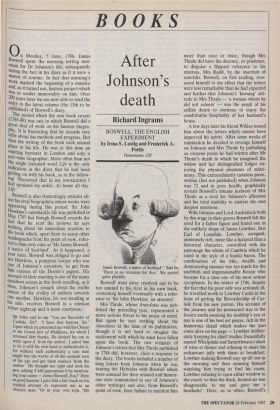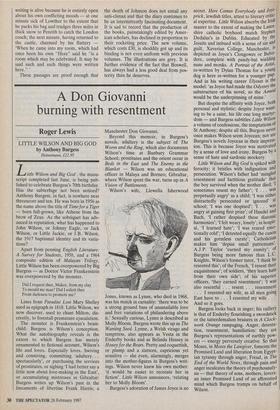BOOKS
After Johnson's death
Richard Ingrams
BOSWELL: THE ENGLISH EXPERIMENT by Irma S. Lustig and Frederick A. Pottle Heinemann, f30 On Monday, 5 June, 1786, James Boswell spent the morning sorting mat- erials for Dr Johnson's life, subsequently noting the fact in his diary as if it were a matter of routine. In fact that morning's work marked the beginning of a massive and, as it turned out, historic project which was to confer immortality on him. Over 200 years later we are now able to read the entry in the latest volume (the 13th to be published) of Boswell's diary. The period which the new book covers (1785-89) was one in which Boswell did a great deal of work on his famous biogra- phy. It is frustrating that he records very little about his methods and progress. But then the writing of the book took second place in his life. He was at this time an aspiring barrister in London and only a Part-time biographer. More often than not the single italicised word Life is the only indication in the diary that he had been getting on with his book, as in the follow- ing: 'Perceived that in my intoxication I had sprained my ankle. At home all day.
Boswell is also frustratingly reticent ab- out his rival biographers whose works were aPpearing during this period. Sir John Hawkins's ramshackle life was published in May 1787 but though Boswell records the fact that he read the reviews he says nothing about his immediate reaction to the book which, apart from its many other inadequacies from his point of view, refer- red to him only once as 'Mr James Boswell, a native of Scotland'. As it happened, a year later, Boswell was obliged to go and see Hawkins, a pompous lawyer who was one of Johnson's executors, to get from him various of the Doctor's papers. His account of their meeting is one of the many excellent scenes in this book recalling, as it does, Johnson's remark about the risible nature of the civility of authors towards one another. Hawkins, his son standing at his side, receives Boswell in a crimson velvet nightcap and is most courteous: Sir John said to me 'You are Recorder of Carlisle, Sir?'. 'I have that honour, Sir.' Upon which he presented me with his Charge to the Grand Jury of Middlesex, for which I returned him thanks. He desired his son to write upon it 'from the author'. I asked him to do it with his own hand to authenticate it, for without such authenticity a vain man might buy the works of all the eminent men of his age and get them marked 'from the author'. He thought me right and took his pen, adding 'I will appropriate it by mention- ing your name —James Boswell, Esq?' Here in good humour I gave him a fair touch on his studied attempt to represent me as an obscure man. 'Or in your own style "Mr
James Boswell, a native of Scotland".' Said he, 'There is no occasion for that.' We parted quite placidly.
Boswell went away resolved not to be too unkind to his rival in his own book, contenting himself eventually with a refer- ence to 'Sir John Hawkins, an attorney'.
Mrs Thrale, whose Anecdotes was pub- lished the preceding year, represented a more serious threat to his peace of mind. But again he says nothing about the Anecdotes at the time of its publication, though it is not hard to imagine the excitement with which he must have fallen upon the book. The two volumes of Johnson's letters that Mrs Thrale published in 1788 did, however, elicit a response in the diary. The books included a number of long letters from Johnson when he was touring the Hebrides with Boswell which were unusual for their relaxed and humor- ous style (unmatched in any of Johnson's other writings) and also, from Boswell's point of view, their failure to mention him more than once or twice, though Mrs Thrale did have the decency, or prudence, to disguise a flippant reference to his mistress, Mrs Rudd, by the insertion of asterisks. Boswell, on first reading, reas- sured himself to the effect that the letters were less remarkable than he had expected and further that Johnson's 'fawning' atti- tude to Mrs Thrale — 'a woman whom he did not esteem' — was the result of his selfish desire to continue to enjoy the comfortable hospitality of her husband's house.
A few days later his friend Wilkes teased him about the letters which cannot have improved his spirits. After some weeks of rumination he decided to revenge himself on Johnson and Mrs Thrale by publishing an obscene poem he had written after Mr Thrale's death in which he imagined the widow and her distinguished lodger en- joying the physical pleasures of matri- mony. This extraordinarily tasteless piece, written (but not published) when Johnson was 72 and in poor health, graphically reveals Boswell's intense jealousy of Mrs Thrale as a rival for Johnson's affection and his total inability to analyse his own deepest emotions. With Johnson and Lord Auchinleck both by this stage in their graves Boswell felt the need for a father figure and found one in the unlikely shape of James Lowther, first Earl of Lonsdale. Lowther, arrogant, immensely rich, more like a fictional than a historical character, controlled with his patronage the whole of Cumbria which he ruled in the style of a feudal baron. The combination of his title, wealth and domineering manner was too much for the snobbish and impressionable Bozzie who became for a time one of his most ardent sycophants. In the winter of 1786, despite the fact that his poor wife was seriously ill, he travelled north to Lowther Castle in the hope of getting the Recordership of Car- lisle from his new patron. His account of the journey and his protracted stay in the frozen north awaiting his lordship's yea or nay is one of his best set pieces, rich in the humorous detail which makes the past come alive on the page — Lowther deliber- ately keeping his chief toadies (beautifully named Whelpdale and Satterthwaite) short of wine at dinner and refusing to share his redcurrant jelly with them at breakfast; Lowther making Boswell stay up till one in the morning and then amusing himself watching him trying to find his room; Lowther refusing to open either window in the coach 'so that the thick, heated air was disagreeable to me and gave me a headache'. Here, as so often, Boswell's writing is alive because he is entirely open about his own conflicting moods — at one minute sick of Lowther to the extent that he packs his bag and trudges three miles in thick snow to Penrith to catch the London coach; the next minute, having returned to the castle, charmed by his flattery `When he came into my room, which had once been his own "Here" said he "is a room which may be celebrated. It may be said such and such things were written here." ' These passages are proof enough that the death of Johnson does not entail any anti-climax and that the diary continues to be an intermittently fascinating document. It is sad to record that the production of the books, painstakingly edited by Amer- ican scholars, has declined in proportion to their rocketing price. The new volume, which costs f30, is shoddily got up and its binding is not even uniform with previous volumes. The illustrations are grey. It is further evidence of the fact that Boswell, has always had a less good deal from pos- terity than he deserves.



















































 Previous page
Previous page